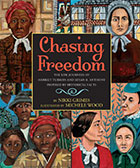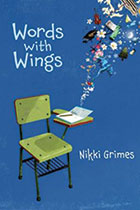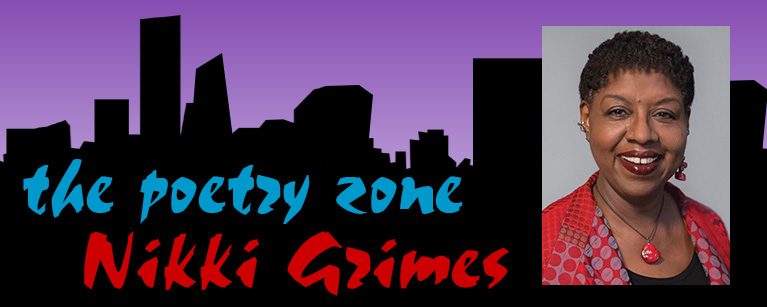A recent blog by Sally Lloyd-Jones got me thinking about a question we authors hear some version all the time: Where do you get your ideas, or how do you come up with ideas for your stories? The question would suggest that there’s a treasure trove, somewhere, packed with stories ready for the taking. Or that there’s a place one could go, a repository one can simply dip into, at will. But, the truth is, story ideas are more elusive than that. Their source is far less predictable, more a matter of magic, or of serendipity. An idea might spring from a period of fasting, or flash of insight during a meditative state, or result from literally tripping over an object that brings that idea to mind. No matter the origin of an idea, or the vehicle that brought it to you, that idea, that story, is a gift.
 I’ve been thinking about my newest title, Chasing Freedom, releasing in January 2015, and trying to trace it’s origins. The initial idea came to me while I was busy working on something else. The something else was a series of dramatic monologues for a theater production to be performed in China, in 1988. The theme of the show was American History, and so I chose as my subjects Frederick Douglass, Harriet Tubman, and Susan B. Anthony. In the midst of researching their stories, and crafting their monologues, I became excited to learn that they not only lived at the same time, but all knew each other. One day, while thumbing through these histories in the stacks of the Doheny Library at USC, I suddenly thought, “I wonder what it would be like if Harriet Tubman and Susan B. Anthony sat down for a talk.” That notion was the seed that eventually led to my writing Chasing Freedom. I wasn’t looking for an idea, mind you. It simply arrived of its own! A gift.
I’ve been thinking about my newest title, Chasing Freedom, releasing in January 2015, and trying to trace it’s origins. The initial idea came to me while I was busy working on something else. The something else was a series of dramatic monologues for a theater production to be performed in China, in 1988. The theme of the show was American History, and so I chose as my subjects Frederick Douglass, Harriet Tubman, and Susan B. Anthony. In the midst of researching their stories, and crafting their monologues, I became excited to learn that they not only lived at the same time, but all knew each other. One day, while thumbing through these histories in the stacks of the Doheny Library at USC, I suddenly thought, “I wonder what it would be like if Harriet Tubman and Susan B. Anthony sat down for a talk.” That notion was the seed that eventually led to my writing Chasing Freedom. I wasn’t looking for an idea, mind you. It simply arrived of its own! A gift.
 I turned my thoughts to Words With Wings, a novel-in-verse about daydreaming, and I tried to trace the origins of that story. This task was more difficult, because the genesis of the idea was much less straightforward. Over the years, I’d read or heard comments by teachers about the importance of nurturing the imagination; read or heard Steve Jobs bemoan the fact that children are no longer encouraged to daydream; read or heard nameless others comment on this subject, in one way or another. Somewhere along the line, this train of thought stuck, and I began thinking about my own childhood, and how important daydreaming had been in my own formation, and later success, and I realized how much I wanted that for the children I serve through my work. Out of this thick soup of essays, articles, off-hand commentary, and personal memories grew the idea for a novel about a daydreamer. So there.
I turned my thoughts to Words With Wings, a novel-in-verse about daydreaming, and I tried to trace the origins of that story. This task was more difficult, because the genesis of the idea was much less straightforward. Over the years, I’d read or heard comments by teachers about the importance of nurturing the imagination; read or heard Steve Jobs bemoan the fact that children are no longer encouraged to daydream; read or heard nameless others comment on this subject, in one way or another. Somewhere along the line, this train of thought stuck, and I began thinking about my own childhood, and how important daydreaming had been in my own formation, and later success, and I realized how much I wanted that for the children I serve through my work. Out of this thick soup of essays, articles, off-hand commentary, and personal memories grew the idea for a novel about a daydreamer. So there.
The origin of the idea for my next book, Poems in the Attic, out next spring, is a bit clearer, but not much. I watch the nightly news as much as anyone, and I’ve noticed a barrage of stories about our military over the recent years. With troops in Afghanistan, Iran, and Iraq, especially, this last decade has produced miles of videotape about soldiers. I especially noticed the preponderance, of late, of images on television of soldiers returning home, snuggling with their children after long tours away, images of both fathers and mothers in uniform, nearly wrestled to the ground by children so excited to have them home, again. These images stuck. Then, there was the show Army Wives, which brought these themes into my living room weekly. Besides the above, there’s the fact that several of my friends regularly share childhood stories of growing up as military brats. At some point, a couple of years ago, I started thinking about the increasing number of children who have to negotiate the uncertainty of life with a parent in the military, and I wondered if I might offer some small collection of poetry that would speak into that. Hence, the story-in-verse book, Poems in the Attic.
The answer to the question of where stories come from is rather random, isn’t it? It’s mysterious. It’s magical. It’s simple: a story, and the idea that gives birth to it, is—a gift. Yeah. That sounds about right.


